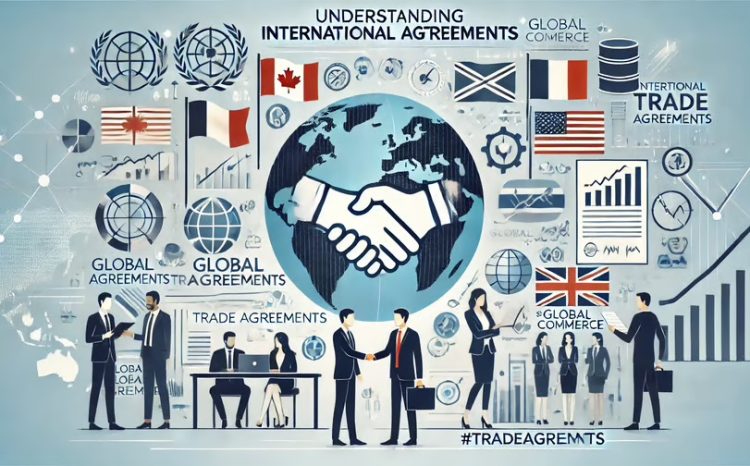Introduction
In the age of globalization, economic relationships between countries are more important than ever. Among the most significant economic partnerships are the trade relations between Europe and the United States, two of the world’s largest and most influential economies. Historically, the transatlantic trade alliance has been a cornerstone of global commerce, providing benefits to both sides of the Atlantic in terms of job creation, market access, and innovation. However, the global economic landscape is constantly evolving, and there are new challenges to overcome in strengthening this critical relationship. In this article, we will explore the current state of trade relations between Europe and the U.S., identify key sectors benefiting from transatlantic trade agreements, examine the challenges in negotiating stronger economic ties, and offer expert predictions on the future of this important economic alliance.
1. Overview of Current Trade Relations Between Europe and the U.S.
Trade relations between Europe and the United States are deeply rooted in decades of economic cooperation. The U.S. is one of the European Union’s largest trading partners, with bilateral trade in goods and services exceeding $1 trillion annually. The European Union, on the other hand, is the U.S.’s largest trading partner in terms of goods and services, accounting for around 20% of U.S. imports and exports.
At the core of this partnership is the long-standing U.S.-EU trade agreement framework, which facilitates the flow of goods, services, and capital. Both regions have benefited significantly from this partnership, with millions of jobs tied directly or indirectly to transatlantic trade. Additionally, trade between the U.S. and Europe has been instrumental in shaping global supply chains, with many businesses operating in both regions to serve a wider global market.
In recent years, however, both the U.S. and Europe have faced new challenges that have tested the strength and resilience of their trade relationship. These include the rise of protectionism, trade tensions between major powers, and economic shifts brought about by technological innovation and geopolitical events. The ongoing tensions surrounding the Brexit process have also added complexity to Europe’s trade dynamics, particularly in relation to the U.K.
Despite these challenges, the transatlantic economic relationship remains critical for both sides, and there is a growing recognition of the need to modernize and strengthen this alliance to meet the demands of the 21st century economy.
2. Key Sectors Benefiting from Transatlantic Trade Agreements
Several sectors stand out as beneficiaries of the strong trade ties between Europe and the U.S. These industries have flourished as a result of favorable trade agreements, and they continue to play a pivotal role in driving economic growth for both regions.
- Technology and Digital Services: The technology sector is one of the most important industries for transatlantic trade, driven by innovations in artificial intelligence, cloud computing, data analytics, and cybersecurity. Both Europe and the U.S. are home to some of the world’s leading tech companies, with significant investment in research and development on both sides of the Atlantic. The tech industry benefits from favorable trade agreements that promote the free flow of data, intellectual property protections, and harmonization of digital regulations.
- Automotive Industry: The automotive sector has long been a major component of transatlantic trade, with the U.S. importing European luxury cars and trucks while Europe imports American-made vehicles, particularly in the form of electric vehicles (EVs) and autonomous driving technology. The EU and U.S. have also entered into agreements to reduce tariffs and promote sustainable automotive innovations, particularly in relation to the development of EV infrastructure.
- Pharmaceuticals and Healthcare: The pharmaceutical and healthcare sectors have also been major beneficiaries of transatlantic trade. Europe and the U.S. are global leaders in medical research and biotechnology, with companies from both regions frequently collaborating on the development of groundbreaking treatments and technologies. Trade agreements in this sector help to ensure the free movement of medical goods and services, streamline regulatory processes, and protect intellectual property rights, thus fostering innovation and ensuring that both regions benefit from advances in medical technology.
- Financial Services: The financial services sector is another critical area of transatlantic cooperation. The U.S. and Europe have strong financial markets that are interconnected through the international use of the dollar and euro. Investment opportunities, cross-border capital flows, and financial technology (FinTech) developments are key elements of this partnership. As the global financial system evolves, both regions have made efforts to harmonize regulations to facilitate easier market access and ensure stability in financial transactions.
- Agriculture and Food Products: Trade between Europe and the U.S. also involves significant agricultural exchanges, with Europe importing American grains, meat, and dairy products, and the U.S. importing European wine, dairy, and specialty foods. Trade agreements help reduce barriers to this sector and support fair trade practices, ensuring that both sides benefit from the agricultural trade relationship.

3. Challenges in Negotiating Stronger Economic Ties
While there are many opportunities for enhancing transatlantic trade, several challenges need to be addressed in negotiations to strengthen economic ties between Europe and the U.S.
- Protectionism and Trade Barriers: One of the most significant challenges to improving trade relations is the growing rise of protectionist policies. Both Europe and the U.S. have seen political movements that favor domestic industries over international trade. In the U.S., the “America First” policy under former President Donald Trump saw the imposition of tariffs on European goods, which led to trade tensions. Similarly, Europe has implemented trade barriers to protect local industries. These protectionist measures can disrupt trade and complicate efforts to form stronger alliances.
- Regulatory Divergence: Another challenge is the divergence in regulations between the U.S. and Europe. In areas like data privacy, consumer protection, and environmental standards, the regulatory frameworks in both regions can differ significantly. For example, Europe’s General Data Protection Regulation (GDPR) is more stringent than the U.S.’s data protection laws, which can create challenges for companies operating in both regions. Efforts to harmonize regulations and align standards across industries are essential for fostering smoother trade relations.
- Geopolitical Tensions and Global Trade Dynamics: Geopolitical tensions, such as trade conflicts with China, can complicate efforts to forge stronger economic alliances between Europe and the U.S. Both sides must navigate global trade dynamics carefully to avoid being drawn into conflicts that could undermine their economic cooperation. Furthermore, the rise of new economic powers and regional trade agreements in Asia and Latin America presents competition that could challenge the dominance of transatlantic trade relations.
- Brexit and European Fragmentation: Brexit has added an additional layer of complexity to Europe’s trade relationships, particularly for the U.K.’s role in transatlantic commerce. With the U.K. no longer part of the European Union, it has had to renegotiate its trade deals with both the U.S. and EU separately, creating confusion and potential disruption. This fragmentation poses a challenge to the coherence of the European economic bloc and complicates negotiations for future agreements between Europe and the U.S.
4. Expert Predictions on the Future of Europe-America Trade Relations
Experts are divided on the future trajectory of Europe-America trade relations, but there is a general consensus that there is both opportunity and risk ahead.
Some experts predict that the U.S. and Europe will deepen their economic partnership as they both seek to counterbalance the rising influence of China. Cooperation in technology, defense, and green energy is expected to be a focal point of future trade negotiations, with both sides working to align policies to promote sustainable development and innovation.
Other analysts caution that the increasing trend toward nationalism and protectionism may hinder efforts to strengthen trade relations. The rise of populist leaders in both Europe and the U.S. could potentially undermine multilateral trade frameworks, making it more difficult to reach consensus on key issues. However, there is also optimism that the growing global challenges—such as climate change and cybersecurity—will drive transatlantic cooperation as the U.S. and Europe recognize their shared interests.
Ultimately, the future of Europe-America trade relations will depend on the ability of both regions to overcome their differences and build a more cohesive and resilient economic partnership that reflects the realities of the 21st century.
Conclusion
The economic alliance between Europe and the United States remains a cornerstone of global trade, with many sectors benefiting from ongoing cooperation. However, challenges such as protectionism, regulatory divergence, and geopolitical tensions threaten to undermine this relationship. By addressing these challenges and capitalizing on shared opportunities, Europe and America can forge a stronger economic partnership in the years to come. Through negotiation, compromise, and a focus on mutual benefit, this vital trade relationship has the potential to thrive in an increasingly interconnected global economy.































